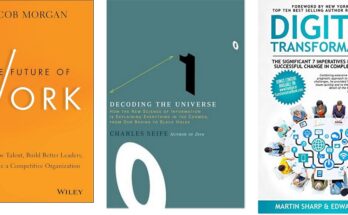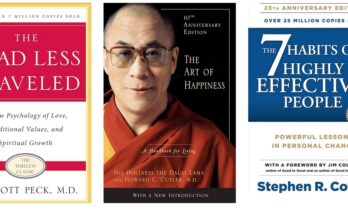


Mindsight" by Daniel J. Siegel vs Blink: The Power of Thinking Without Thinking" by Malcolm Gladwell Vs The Tipping Point" by Malcolm Gladwell
“Mindsight” by Daniel J. Siegel, “Blink: The Power of Thinking Without Thinking” by Malcolm Gladwell, and “The Tipping Point” by Malcolm Gladwell
| Aspect | “Mindsight” by Daniel J. Siegel | “Blink: The Power of Thinking Without Thinking” by Malcolm Gladwell | “The Tipping Point” by Malcolm Gladwell |
|---|---|---|---|
| Core Ideas | Mindsight, integration, neuroscience, mindfulness | Thin-slicing, intuition, bias, rapid cognition | Tipping point, law of the few, stickiness factor, context |
| Focus | Self-awareness, emotional regulation, empathy, mental health, brain plasticity | Power and pitfalls of rapid cognition, decision-making, intuition, biases | Mechanisms of social change, small actions leading to big effects, spread of ideas |
| Writing Style | Informative, compassionate, blends science with anecdotes | Engaging, narrative, blends storytelling with research | Clear, compelling, journalistic approach |
| Structure | Chapters focusing on different aspects of mental health and integration | Chapters exploring different aspects of rapid cognition and decision-making | Sections detailing components of the tipping point phenomenon |
| Use of Examples | Rich use of case studies and personal stories | Extensive use of real-life examples, anecdotes, and studies | Numerous case studies and historical examples |
| Author Background | Clinical professor of psychiatry, expertise in mindfulness and neurobiology | Journalist and author with a background in sociology and history | Journalist and author with a focus on social science concepts |
| Perspective | Combines scientific research with mindfulness practices | Journalistic approach making complex ideas accessible | Journalistic approach explaining complex ideas clearly |
| Critical Reception | Praised for integration of neuroscience and mindfulness, practical applications | Generally well-received, some criticism for oversimplification | Widely acclaimed for insightful analysis of social dynamics |
| Impact on Readers | Transformative for personal growth and relationships | Influential in shaping understanding of decision-making and intuition | Helped readers understand factors contributing to spread of ideas and behaviors |
| Field Impact | Popularized mindfulness and interpersonal neurobiology | Popularized concept of thin-slicing, brought attention to rapid cognition | Influenced marketing, public health, social sciences |
| Unique Contributions | Emphasizes healing through self-awareness and empathy, highlights brain’s ability to change (neuroplasticity) | Explores the power of quick decisions and intuition, warns about biases that affect them | Explains how small changes can lead to significant shifts in society, highlights the role of key individuals and context in spreading ideas |
Detailed Comparison
Emotional Regulation and Mental Health
Mindsight: “Mindsight” by Daniel J. Siegel emphasizes emotional regulation and mental health through the concept of mindsight, which combines insights from neuroscience and mindfulness. Siegel explains how developing mindsight can lead to better emotional regulation by understanding and shaping the inner workings of the mind. He highlights the brain’s plasticity, showing that mental practices can rewire neural pathways to improve emotional resilience and well-being.
Blink: “Blink” by Malcolm Gladwell does not directly address emotional regulation or mental health. Instead, it focuses on rapid cognition and how quick decisions can be effective but are also susceptible to biases. The book discusses the emotional components of these snap judgments and the subconscious processes that influence them, suggesting that understanding these processes can help mitigate negative impacts on mental health.
The Tipping Point: “The Tipping Point” by Malcolm Gladwell does not specifically focus on emotional regulation or mental health. However, it examines how small, emotionally charged actions can trigger tipping points, leading to significant changes in group behavior. Understanding these social dynamics can indirectly contribute to mental health by promoting positive social environments and behaviors.
Empathy
Mindsight: Empathy is a central theme in “Mindsight.” Siegel demonstrates how developing mindsight enhances empathy by improving our ability to understand and relate to others’ mental states. This improved empathy can lead to stronger, more meaningful relationships and better interpersonal dynamics.
Blink: In “Blink,” Gladwell discusses how empathy influences snap judgments and quick decisions. He highlights situations where empathy-driven intuition leads to effective decisions, while also cautioning about biases that can distort empathetic responses. The book encourages a balance between trusting instincts and being aware of potential biases.
The Tipping Point: Empathy is examined in “The Tipping Point” through the role of social connectors—individuals who naturally understand and relate to others. These connectors are crucial in spreading ideas and behaviors, demonstrating how empathy within social networks can lead to tipping points and significant societal shifts.
Decision-Making and Social Change
Mindsight: While “Mindsight” primarily focuses on self-awareness and mental health, it also touches on decision-making by emphasizing the importance of understanding and shaping our thought processes. This can lead to more mindful and informed decisions, both personally and interpersonally.
Blink: “Blink” centers on decision-making, specifically the power and pitfalls of rapid cognition. Gladwell explores how quick, intuitive decisions can be as effective as those made after thorough deliberation, but also highlights the risks of biases and errors. The book provides insights into when to trust our instincts and when to question them.
The Tipping Point: “The Tipping Point” explores the mechanisms of social change and how small actions can lead to big effects. Gladwell explains how key individuals, memorable messages, and contextual factors contribute to tipping points, resulting in widespread changes in behavior and trends. This understanding of social dynamics can inform strategic decision-making in various fields.
Conclusion
“Mindsight” by Daniel J. Siegel, “Blink: The Power of Thinking Without Thinking” by Malcolm Gladwell, and “The Tipping Point” by Malcolm Gladwell each offer unique insights into human behavior and psychology. “Mindsight” focuses on self-awareness, emotional regulation, and empathy through the lens of neuroscience and mindfulness. “Blink” delves into the power and pitfalls of rapid cognition, emphasizing the role of intuition and the need to be aware of biases. “The Tipping Point” examines the dynamics of social change, highlighting how small actions and key individuals can trigger significant societal shifts. Together, these books provide a comprehensive understanding of the mind, decision-making, and the forces that shape our world.



